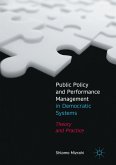The original Handbook of Public Administration was a landmark publication, the first to provide a comprehensive and authoritative survey of the discipline. The eagerly-awaited new edition of this seminal international handbook continues to provide a complete review and guide to past and present knowledge in this essential field of inquiry.
Assembling an outstanding team of scholars from around the world, the second edition explores the current state-of-the-art in academic thinking and the current structures and processes for the administration of public policy.
The second edition has been fully revised and updated, with new chapters that reflect emerging issues and changes within the public sector:
- Identifying the Antecedents in Public Performance
- Bureaucratic Politics
- Strategy Structure and Policy Dynamics
- Comparative Administrative Reform
- Administrative Ethics
- Accountability through Market and Social Instruments
- Federalism and intergovernmental coordination.
A dominant theme throughout the handbook is a critical reflection on the utility of scholarly theory and the extent to which government practices inform the development of this theory. To this end it serves as an essential guide for both the practice of public administration today and its on-going development as an academic discipline.
The SAGE Handbook of Public Administration remains indispensable to the teaching, study and practice of public administration for students, academics and professionals everywhere.
Assembling an outstanding team of scholars from around the world, the second edition explores the current state-of-the-art in academic thinking and the current structures and processes for the administration of public policy.
The second edition has been fully revised and updated, with new chapters that reflect emerging issues and changes within the public sector:
- Identifying the Antecedents in Public Performance
- Bureaucratic Politics
- Strategy Structure and Policy Dynamics
- Comparative Administrative Reform
- Administrative Ethics
- Accountability through Market and Social Instruments
- Federalism and intergovernmental coordination.
A dominant theme throughout the handbook is a critical reflection on the utility of scholarly theory and the extent to which government practices inform the development of this theory. To this end it serves as an essential guide for both the practice of public administration today and its on-going development as an academic discipline.
The SAGE Handbook of Public Administration remains indispensable to the teaching, study and practice of public administration for students, academics and professionals everywhere.
Dieser Download kann aus rechtlichen Gründen nur mit Rechnungsadresse in A, D ausgeliefert werden.
'Guy Peters and Jon Pierre are rightly regarded as leading figures in the area, but even that does not guarantee the striking breadth reflected in the company of contributors: this quality may be because the 14 separate areas covered in the volume are 'franchised' to separate expert (and geographically scattered) 'part editors' to coordinate and discuss entries. There is in consequence a similarly striking breath to the field reviewed. The title is somewhat 'retro' as the intellectual tradition is again reclaimed from policymaking, public sector management and other competing perspectives that have emerged. But while the label may be traditional, the content undermines any negatives associations that implies' -
Grant Jordan
Emeritus Professor of Politics, the University of Aberdeen
'If you are interested in a comprehensive yet compact and accessible account of current scholarly work on public sector organizations, this is the volume to have at hand. For this Handbook is not only a masterly and authoritatively selected collection of brilliant contributions, it also serves - interdisciplinary and comparative in outlook as it is - as a much needed cross-fertilizer between subfields of the public administration community' -
Eckhard Schroeter
Professor of Administrative Sciences, Zeppelin University
'Guy Peters and Jon Pierre and their colleagues have made an already essential handbook even more essential for students of public administration. New chapters on subjects such as administrative history, bureaucratic politics, representative bureaucracy, and intergovernmental relations add to the other excellent pieces to make for a magnificently comprehensive volume. Anyone interested in the administration of the contemporary state will want to read this volume and to have a copy of it at hand' -
Joel Aberbach
Distinguished Professor of Political Science and Public Policy, UCLA
Grant Jordan
Emeritus Professor of Politics, the University of Aberdeen
'If you are interested in a comprehensive yet compact and accessible account of current scholarly work on public sector organizations, this is the volume to have at hand. For this Handbook is not only a masterly and authoritatively selected collection of brilliant contributions, it also serves - interdisciplinary and comparative in outlook as it is - as a much needed cross-fertilizer between subfields of the public administration community' -
Eckhard Schroeter
Professor of Administrative Sciences, Zeppelin University
'Guy Peters and Jon Pierre and their colleagues have made an already essential handbook even more essential for students of public administration. New chapters on subjects such as administrative history, bureaucratic politics, representative bureaucracy, and intergovernmental relations add to the other excellent pieces to make for a magnificently comprehensive volume. Anyone interested in the administration of the contemporary state will want to read this volume and to have a copy of it at hand' -
Joel Aberbach
Distinguished Professor of Political Science and Public Policy, UCLA









